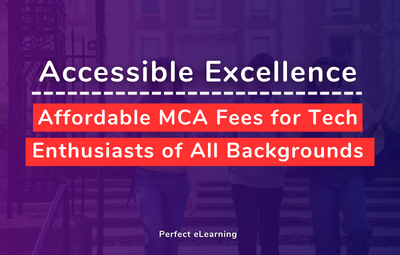

MCA education plays a vital role in nurturing the future leaders of the digital age. As technology evolves, educators must embrace the latest tools and techniques to prepare students for the challenges and opportunities that lie ahead. Emerging technologies not only facilitate a more immersive and interactive learning experience but also equip students with the skills required to thrive in the modern workforce. Let's explore some of the most promising emerging technologies that are reshaping MCA education.
The Importance of Emerging Technologies in MCA Education
In today's competitive landscape, it is essential for MCA students to stay ahead of the curve. Emerging technologies offer a transformative way to enhance the educational experience and equip students with the skills demanded by the industry. By integrating these technologies into the curriculum, educators can bridge the gap between theoretical knowledge and practical application, fostering critical thinking, problem-solving, and innovation.
Virtual Reality: Revolutionizing MCA Education
Immersive Learning Experiences
Virtual reality (VR) has the power to transport students beyond the confines of the traditional classroom. By simulating real-world environments, VR enables students to engage in hands-on experiences and interact with complex concepts. Whether it's exploring architectural designs or analyzing complex algorithms, virtual reality immerses students in a world where they can experiment, make mistakes, and learn from their experiences.
Simulations and Virtual Laboratories
Virtual reality also enables the creation of virtual laboratories, eliminating the constraints of physical space and expensive equipment. MCA students can delve into virtual simulations of computer networks, cybersecurity scenarios, and software development environments. These simulations provide a safe and controlled environment for students to practice their skills, experiment with different scenarios, and gain practical experience that is crucial in their future careers.
Enhanced Student Engagement
Traditional lectures often struggle to keep students engaged and attentive. Virtual reality offers a captivating and interactive learning experience that can significantly enhance student engagement. By creating immersive scenarios and gamified challenges, educators can leverage VR technology to make learning more enjoyable, stimulating, and memorable. The emotional impact of VR experiences fosters a deeper connection with the subject matter, making learning a truly transformative process.
Artificial Intelligence: Transforming MCA Education
Intelligent Tutoring Systems
Artificial intelligence (AI) is revolutionizing MCA education through intelligent tutoring systems. These systems adapt to the individual learning needs of students, providing personalized guidance, feedback, and support. By analyzing data on student performance and understanding their strengths and weaknesses, AI-powered tutoring systems can tailor the learning experience to maximize student potential. This personalized approach ensures that students receive the support they need to excel in their academic journey.
Automated Grading and Feedback
Grading a large number of assignments can be a time-consuming task for educators. With AI-powered automated grading systems, the process becomes more efficient and consistent. These systems utilize natural language processing and machine learning algorithms to evaluate student assignments, providing instant feedback and freeing up valuable time for educators to focus on other aspects of teaching. Automated grading also reduces subjective biases, ensuring fairness and objectivity in the assessment process.
Personalized Learning Paths
Every student has a unique learning style and pace. AI technology enables the creation of personalized learning paths tailored to individual students. By analyzing data on student performance, interests, and preferences, AI algorithms can recommend specific learning resources, projects, and activities that align with each student's strengths and goals. This personalized approach empowers students to take ownership of their learning journey, fostering autonomy, motivation, and a deeper understanding of the subject matter.
Internet of Things: Enhancing MCA Education
Smart Classrooms and Learning Spaces
The Internet of Things (IoT) offers a wealth of opportunities to create smart classrooms and learning spaces. IoT-enabled devices can seamlessly connect and communicate, creating an interconnected environment that enhances the learning experience. Smartboards, interactive displays, and IoT sensors can facilitate real-time collaboration, information sharing, and dynamic interaction between students and educators. This interconnectedness fosters a sense of community and promotes active learning.
Real-Time Data Analytics
The proliferation of IoT devices generates vast amounts of data. By harnessing this data through real-time analytics, educators can gain valuable insights into student behavior, performance patterns, and learning preferences. This data-driven approach enables educators to identify areas where students may be struggling, adapt their teaching strategies, and provide timely interventions. Real-time data analytics empowers educators to make data-informed decisions and optimize the learning environment for better student outcomes.
Collaborative Learning Opportunities
The Internet of Things also facilitates collaborative learning opportunities beyond the physical classroom. With IoT-enabled platforms and tools, MCA students can engage in virtual team projects, connect with peers from around the world, and collaborate on complex problem-solving tasks. This global connectivity expands the horizons of MCA education, fostering cross-cultural understanding, promoting diversity, and preparing students for a globally interconnected workforce.
Blockchain Technology: Securing MCA Education
Verification of Credentials and Certificates
Blockchain technology provides a secure and decentralized platform for verifying academic credentials and certificates. By leveraging blockchain, educational institutions can create tamper-proof digital records that can be easily verified by employers and other educational institutions. This eliminates the risk of fraudulent credentials and streamlines the verification process, saving time and ensuring the integrity of academic achievements.
Transparent and Immutable Recordkeeping
One of the key advantages of blockchain technology is its transparent and immutable nature. Educational institutions can use blockchain to create a decentralized ledger that records and verifies academic transactions securely. This transparent recordkeeping ensures that academic records are tamper-proof and can be accessed by authorized parties, providing a reliable and transparent system for storing and managing student data.
Safeguarding Intellectual Property
Intellectual property plays a crucial role in the field of MCA education. Blockchain technology can be utilized to protect intellectual property rights by creating a decentralized and transparent system for sharing and licensing educational content. Through smart contracts and digital rights management, creators can maintain control over their work, ensuring proper attribution and fair use of educational resources.
Cybersecurity: Safeguarding MCA Education
Threat Detection and Prevention
As MCA education becomes increasingly reliant on technology, the need for robust cybersecurity measures becomes paramount. Emerging technologies can be vulnerable to cyber threats, and it is essential to implement effective threat detection and prevention mechanisms. By leveraging AI-driven cybersecurity tools, educational institutions can proactively identify and mitigate potential risks, protecting sensitive student data, research findings, and intellectual property.
Cybersecurity Education and Training
Education on cybersecurity is crucial for MCA students to navigate the digital frontier safely. Integrating cybersecurity education and training into the MCA curriculum equips students with the knowledge and skills to protect themselves and their future organizations from cyber threats. By fostering a cybersecurity-conscious mindset, educational institutions play a pivotal role in nurturing the next generation of cybersecurity professionals.
Protecting Student Data and Privacy
The collection and storage of student data raise concerns about privacy and data security. Educational institutions must prioritize the protection of student data by implementing robust data privacy policies and adhering to data protection regulations. It is essential to establish secure systems for data storage, encryption, and user authentication to safeguard student information from unauthorized access and breaches.
Conclusion
As MCA education journeys into the digital frontier, emerging technologies offer immense opportunities for transformative learning experiences. Virtual reality, artificial intelligence, the Internet of Things, blockchain technology, and robust cybersecurity measures are reshaping the way students learn, collaborate, and excel. By embracing these technologies, educational institutions can empower MCA students to navigate the digital landscape with confidence, preparing them for the challenges and opportunities that lie ahead.
FAQs (Frequently Asked Questions)
Q1: How do emerging technologies benefit MCA education?
A1: Emerging technologies offer immersive experiences, personalized learning paths, enhanced collaboration, and real-time data analytics, enabling students to develop practical skills and stay ahead in the digital age.
Q2: Are these technologies accessible to all students?
A2: While accessibility challenges exist, efforts are being made to ensure equitable access to emerging technologies in MCA education. Educational institutions and policymakers are working to bridge the digital divide and provide equal opportunities for all students.
Q3: What challenges may arise when implementing emerging technologies in MCA education?
A3: Implementing emerging technologies may require significant investment, infrastructure upgrades, and training for educators. It is crucial to address these challenges while ensuring seamless integration and effective use of these technologies.
Q4: How can educators stay updated with the latest trends in emerging technologies?
A4: Educators can stay updated by actively participating in professional development programs, attending conferences, joining online communities, and collaborating with industry experts and technology providers.


